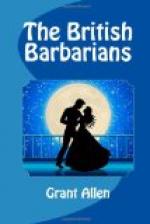Not, again, that any one of these novels will deliberately attempt to prove anything. I have been amused at the allegations brought by certain critics against The Woman who Did that it “failed to prove” the practicability of unions such as Herminia’s and Alan’s. The famous Scotsman, in the same spirit, objected to Paradise Lost that it “proved naething”: but his criticism has not been generally endorsed as valid. To say the truth, it is absurd to suppose a work of imagination can prove or disprove anything. The author holds the strings of all his puppets, and can pull them as he likes, for good or evil: he can make his experiments turn out well or ill: he can contrive that his unions should end happily or miserably: how, then, can his story be said to prove anything? A novel is not a proposition in Euclid. I give due notice beforehand to reviewers in general, that if any principle at all is “proved” by any of my Hill-top Novels, it will be simply this: “Act as I think right, for the highest good of human kind, and you will infallibly and inevitably come to a bad end for it.”
Not to prove anything, but to suggest ideas, to arouse emotions, is, I take it, the true function of fiction. One wishes to make one’s readers think about problems they have never considered, feel with sentiments they have disliked or hated. The novelist as prophet has his duty defined for him in those divine words of Shelley’s:
“Singing songs unbidden
Till the world is wrought
To sympathy with hopes
and fears it heeded not.”
That, too, is the reason that impels me to embody such views as these in romantic fiction, not in deliberate treatises. “Why sow your ideas broadcast,” many honest critics say, “in novels where mere boys and girls can read them? Why not formulate them in serious and argumentative books, where wise men alone will come across them?” The answer is, because wise men are wise already: it is the boys and girls of a community who stand most in need of suggestion and instruction. Women, in particular, are the chief readers of fiction; and it is women whom one mainly desires to arouse to interest in profound problems by the aid of this vehicle. Especially should one arouse them to such living interest while they are still young and plastic, before they have crystallised and hardened into the conventional marionettes of polite society. Make them think while they are young: make them feel while they are sensitive: it is then alone that they will think and feel, if ever. I will venture, indeed, to enforce my views on this subject by a little apologue which I have somewhere read, or heard,—or invented.




